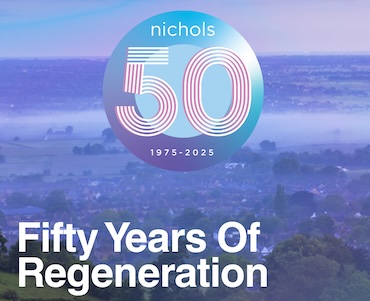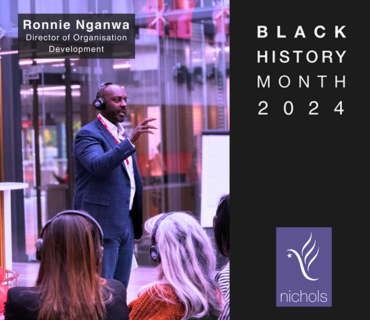- BC
- BC

News

News



A night to remember.
Last month we proudly celebrated 50 years of Nichols – five decades of innovation, dedication, and meaningful success.
Thank you to everyone who has been part of our story and helped build our legacy.
Here’s to the next 50!

Sustainable growth requires a vision that considers the full ecosystem of a place – its community, culture, connectivity, services, and social fabric. Nichols unique strength is combining vision, delivery expertise, and a focus on community impact to create meaningful and lasting change.
Throughout the last fifty years, Nichols has had the privilege of working on some of the world’s most ambitious regeneration projects. These initiatives have reshaped city skylines, reconnected communities, revived underused spaces, and reimagined how people live, work, and move.
In our first decade, Nichols strategic support was pivotal in delivering infrastructure led regeneration in Hong Kong. In the 1980s, we delivered the Docklands Light Railway opening up Canary Wharf enabling it to transform into the vibrant area it is today. Nichols supported London’s 2012 Olympic and Paralympic Games from bidding to delivery – boosting the UK economy and creating sustainable growth for people and places. Our work delivering the Elizabeth Line transcended decades. Nichols played a central role transforming Crossrail from vision to reality for 34 years from 1989 until its completion in 2023.
Nichols approach to sustainable growth is centred on development that is inclusive and outcome focused – we want to create places that people want to be. We have had the privilege of helping shape such visions and bringing them to life. A fantastic example of this is the £3.6 billion Towns Fund programme. As part of the Programme Delivery Partner, we worked to enable 101 towns in England to level up and drive long term sustainable economic regeneration to improve prospects for their communities.
As we mark our 50th year we will be exploring how we can shape the next era of truly transformative change. We are excited about a future where we continue help deliver places that achieve sustainable growth, supporting our clients to create bold visions – driving greater equity, and unlocking the conditions for people and places to truly flourish.

Nichols Staff, friends, clients and colleagues had a very warm and enjoyable time attending the MPA Prestige Lecture at the Institution of Civil Engineers yesterday. The talk was given by the economist Bridget Rosewell who gave some fascinating reflections on her extensive career as an academic and then advising companies and government departments on making the case for major projects. There were so many insights, one of the key ones was around making the case for a project. Many people today only focus on the numbers and the logic of a case striving for certainty. However, for many major projects there are things that have not been done before and so to “prove” they will deliver this benefit, cost this much and take this long is not realistic, yet we continue to pursue these approaches. These major projects are novel and may have unanticipated benefits, so we cannot prove what shape they are using past examples. She advocated using numbers, but showing our levels of uncertainty as we move out. A key addition to this approach is to tell the story of what outcomes we are trying to achieve and putting it in the context of the wider enterprise. This way we give people the vision of what we are going to achieve and the fact that, for the middle and latter parts of the project journey, we do not have absolute certainty on how we are going to deliver this. Turning this approach into reality and avoiding the old perceptions of failure is our role as project leaders in turning visions into reality.
We began our 50th anniversary year by celebrating with our incredible team.
Our internal launch event at our London home brought everyone together to mark this major milestone. It was a chance to connect, reflect on how far we’ve come, and share the excitement for what lies ahead.
This is just the beginning of a special year for Nichols—and we’re thrilled to take you along with us. Here’s a look behind the scenes at a day full of energy, appreciation and team spirit.

This year, Nichols marks a significant milestone—50 years of delivering transformative change across transport, environment, regeneration and technology.
Since 1975, we’ve been a unique company of strategic change makers, trusted to advise and deliver on some of the most iconic programmes and complex projects in the UK and beyond.
Over the decades, our creativity, intuition and commitment to going above and beyond have helped shape a legacy we’re proud of—and one we’re excited to build on.
As we look ahead to the future, we’re celebrating 50 Years of Change—not just by reflecting on where we’ve been, but by looking forward to what’s next.
To all our clients, partners and colleagues—thank you for being part of our journey so far. Here’s to the next 50. 💫
Energy transition is not just a goal—it’s an imperative. Achieving net zero, fostering economic growth across the UK, and building resilience to climate change demand significant investment in infrastructure over the coming decades. However, with such ambitious objectives, how do we ensure these projects are delivered efficiently and effectively?
The National Infrastructure Commission’s latest report, Cost Drivers of Major Infrastructure Projects in the UK, sheds crucial light on this challenge. Through in-depth analysis and stakeholder engagement, the report outlines actions that could reduce outturn costs of enhancement projects by 10-25%.
Key insights include:
– The importance of clear strategic direction
– The critical role of strong client and project sponsorship
– Working effectively with regulators
– Flexing delivery models to take account of project characteristics and organisational context
At the heart of this lies the need for robust project sponsorship—a discipline that ensures projects remain aligned with strategic goals while managing complexity, risk, and stakeholder engagement.
In our paper, we explore how implementing effective project sponsorship can act as a cornerstone for delivering the infrastructure needed to power the energy transition. By tackling systemic challenges identified in the NIC report, we can transform ambition into action.
Click here to read our paper on project sponsorship: Nichols Sponsorship Paper.
Following on from last week’s clip on Project Sponsorship, Nichols’ Alexandra Batey details how an effective sponsoring body can help deliver UK energy transition.
Please contact info@nichols.uk.com if you would like to learn more about our work in setting up Project Sponsorship.
Delivering UK Energy Transition and other regulated utilities projects requires a strategic approach to enable effective delivery of outcomes. Project Sponsorship will be key to delivering a programme of national significance.
One of our Directors, Alexandra Batey MEng FICE, provides an overview on the role of Sponsors following our recent round table event on Energy Transition with key notes from Sir John Armitt and Rt Hon Chris Skidmore.
Please contact info@nichols.uk.com if you would like to learn more about our work in setting up Project Sponsorship.

At our energy round table at The Londoner Hotel earlier this month, there were some brilliant insights shared from a diverse room of experts, including our keynote speakers, Sir John Armitt and the Rt. Hon. Chris Skidmore. We have been reflecting on the mission ahead and our role as a company to help reach the goal of Net Zero by 2050.
At Nichols, we respect our planet and are committed to supporting the delivery of a sustainable and viable future. The need for action is more urgent than ever, Nichols can help clients realise projects and policies that will help to deliver decarbonisation goals.
With almost 50 years of experience delivering major iconic infrastructure programmes and a team of outstanding specialists, we understand the landscape and challenges of environmental issues. We have the knowledge and expertise to help across the entire environmental arena. We provide navigation through every stage of the project and programme lifecycle, from establishing the case for investment to strategic management of infrastructure delivery.
Nichols helps clients to achieve major change for the better, always providing a bespoke solution to meet client needs and exceed expectations.

Last week, Nichols was proud to participate at an event showcasing the Diversity and Inclusion efforts of 4 gas distribution networks.
To mark Black History Month, leaders and staff from Cadent Gas Limited, SGN, Northern Gas Networks and Wales & West Utilities came together to discuss and share experiences and best practices.
The event at Cadent Gas Limited’s head office in Ansty, Coventry was attended by Nichols’ Director of Organisation Development, Ronnie Zachary Nganwa.
He provided insights and actions on reclaiming personal narratives as a route to progressing within the workplace.
This was met with deep discussion and reflection in the audience, on the source of the stories we hold, and how they have a massive impact on the ways we work in teams and across organisations.
The story illuminated from the talk was the extent to which the organisations present held inclusivity as a strategic advantage and were willing to act on this from the top. This was by setting up and supporting communities and engagement events that help showcase the advantages of Diversity.
Nichols congratulates its friends from Cadent Gas (Diane Bennett, Neena Begra-Kukadia, Krishan Mistry, Belinda Asante & Gloria Adebayo) and from SGN (Sharon Dorrington & Tara Bridges).
We appreciate the invitation opportunity to participate.